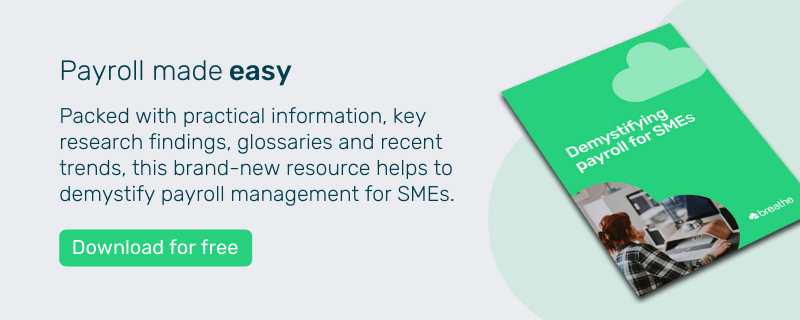Employing people incurs different types of costs above and beyond their salary and benefits. Many businesses employ sales and service-focused people who spend part or most of their time visiting prospects, customers and clients. For these people, accommodation and sustenance make up the majority of expenses which their employers will either need to recompense or authorise if an employee has a company credit or debit card.
In this post we discuss expense management as a process and the fact that in many SMEs, this is a responsibility which is sometimes shared by HR practitioners, finance and payroll managers. We also look at anti-bribery rules and regulations which apply in the UK.
Why is accurate expense management important?
Developing a company anti-bribery policy
The role of expense management software
What is expense management?
Expense management is a set of processes business use to record expenses, make payments and track spending. This includes analysing employee spend, implementing an expense policy and also monitoring for unacceptable or even illegal claims which may constitute bribes.
Why is accurate expense management important?
Expense reimbursements are an integral part of human resources and payroll. It is important to reimburse employees on time and in line with a company’s policies. Expenses can add up – those for accommodation and travel can quickly accrue to significant sums – and failing to reimburse people on time can have serious implications in terms of their household cashflow and ability to meet their personal financial obligations.
Slow or late payments can very easily affect someone’s morale, motivation and dedication to their employer. If they are travelling long distances and spending time away from their families, it’s only right that they reimbursed rapidly if they have had to cover expenses up-front and from their own pockets before submitting them for approval.
Of course, for employees who are provided with company debit and credit cards, this isn’t so much of an issue but in many companies, it’s only people in senior roles who are provided with company payment methods.
Expense management is one of the key areas where businesses have to tread a fine line between cutting back on expenses and spending effectively. This job often falls to the finance department and HR, who between them, are responsible to make the expense management process better, control costs, and reduce errors.
Another key area of effective expense management is to monitor for expense claims which may be regarded as bribes.
The UK Anti-Bribery Act 2010
The Bribery Act came into force on 1st July 2011. Described as the toughest anti-corruption legislation in the world, it has had a significant impact on how businesses of all shapes and sizes in UK conduct their affairs. Small and medium local businesses are by no means exempt from the remit of the Act by virtue of their size.
Individuals guilty of an offence under the Act are liable to a maximum of 10 years’ imprisonment, an unlimited fine or both. Companies guilty of an offence are liable to an unlimited fine. Specifically, the Act creates an offence (under Section 7) which can be committed by commercial organisations, “which fail to prevent persons associated with them from committing bribery on their behalf”.
The offences introduced under the Bribery Act place very real obligations on directors and senior management, particularly in the area of what might loosely be called “hospitality and entertainment expenses”. The Act is undoubtedly forcing businesses to consider their expenses policies and the actions they need to take to ensure compliance.
The crimes which have been identified under the Act are:
- Offering a bribe
- Receiving a bribe
- Failing to prevent a bribe being paid on an organisation’s behalf
It is this 3rd category which causes potential headaches for organisations and careful consideration of potential pitfalls needs to be undertaken when it comes to business operations in general and the management of employee expenses in particular.
The government provides an excellent PDF guide to the UK Anti-Bribery Act to help HR and businesses comply with the law. This guide includes examples of bribes alongside bona fide expense claims which are acceptable. The guide can be downloaded from this page.
Developing a company anti-bribery policy
With the onus as much on HR and companies as well as employees to be aware of what expenses constitute a bribe, it’s important to develop a clear, up-to-date company policy that ensures people understand what they can
The Act states “the commercial organisation will have a full defence if it can show that despite a particular case of bribery it nevertheless had adequate procedures in place to prevent persons associated with it from bribing.”
Therefore, the objective is to ensure that you can demonstrate that you have the procedures and policies in place and avoid any possibility of charges being brought for failure to prevent bribery.
This article provides a detailed outline of what should be included in an anti-bribery and corruption policy and making this accessible to employees.
The role of expense management software
Traditionally, many companies have used spreadsheets or the manual collation of receipts to manage and monitor expenses submitted by employees. This can be a time-consuming process which is also prone to errors. Even for an SME with relatively few people submitting expenses each month, the paper-trail can become long and complicated.
Invalid or even prohibited expenses can slip through the net and this could potentially put a business on a collision course with the law if the Financial Conduct Authority or Serious Fraud office were to investigate anomalies which are deemed to be illegal.
These days, more businesses are adopting systems like Breathe which include dedicated expense management functionality which make managing the process quick and easy, and also provide managers with improved visibility of claims, making it easy to reconcile them with projects.
Receipts can be scanned into the system and submitted for approval. The software can also be configured so people with different responsibilities (e.g. HR, accounts or payroll) have full visibility of every expense as soon as it has been submitted to them. It’s also easy to see what employees are claiming for over a period of time which makes it easier to flag issues, either in terms of people overclaiming or suspicious behavior which could indicate serious irregularities.
Breathe can also be used to store company policy information and ensure it is read by employees as a condition of their employment. Line managers have visibility of who has read a document and also of those who have yet to do so. This can help demonstrate the steps a company has taken to educate its employees about bribery, should the need arise.
Cloud based systems like Breathe enable people to record and submit expenses from wherever they can access the internet and this can reduce the time for approval and recompense.
Adopting dedicated expense management software like Breathe is an important step in enabling those responsible for HR, financial management and payroll to work together efficiently, all with a view to managing expenses proficiently and within the boundaries of company policies and the law.

Author: Aimée Brougham-Chandler
An IDM-certified Digital Copywriter as of February 2023, Aimée is Breathe's Content Assistant. With a passion for guiding readers to solutions for their HR woes, she enjoys delving into & demystifying all things HR: From employee performance to health and wellbeing, leave to company culture & much more.


.webp)

